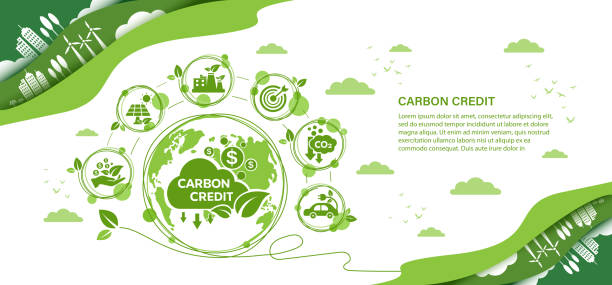In the increasingly urgent context of climate change, many businesses have made commitments to reduce emissions and achieve carbon neutrality. One popular tool used to achieve this goal is carbon offsetting. However, behind the attractive numbers and promises, the carbon offset market is fraught with serious issues, particularly regarding the quality of carbon credits. In-depth research reveals an alarming trend: many carbon credits are of low quality, potentially undermining the credibility of companies' climate claims.
 Carbon offsetting, in essence, involves investing in projects that reduce or remove carbon emissions elsewhere to compensate for the emissions generated from a company's own operations. However, not all carbon offsetting projects are created equal. Many projects, especially those that are cheaper, often come with inherent risks such as:
Carbon offsetting, in essence, involves investing in projects that reduce or remove carbon emissions elsewhere to compensate for the emissions generated from a company's own operations. However, not all carbon offsetting projects are created equal. Many projects, especially those that are cheaper, often come with inherent risks such as:
-
Credit surplus: These projects may exaggerate the amount of carbon reduced or removed, leading to an oversupply of credits in the market.
-
Low-quality projects: Many projects do not meet strict standards of integrity, additionality, and permanence.
-
Inaccurate calculations: The calculation of the amount of carbon reduced or removed may be inaccurate, leading to an overestimation of the project's effectiveness.
The Kariba Project Scandal
A prime example is the Kariba Project in Zimbabwe. Declaring to prevent deforestation, this project raised millions of dollars from selling carbon credits but failed to achieve its promised forest protection goals in reality. This has cast a shadow over the climate claims of major corporations like Volkswagen and Nestlé, which have supported such projects.
Why is low-quality carbon offsetting a problem?
-
Misleading perceptions of emission reduction efforts: Using low-quality carbon offsets can create a false impression of a company's emission reduction efforts, eroding public and investor trust.
-
Undermining the carbon market: The existence of low-quality carbon offsets reduces the value of high-quality carbon credits, making it difficult for genuine businesses to compete.
-
Hindering the green transition: Instead of focusing on direct emission reductions, many businesses are pouring money into carbon offsets, slowing down the transition to a green economy.
As awareness of the pitfalls of low-quality carbon credits grows, companies are increasingly concerned about the reputational risks associated with them. A late-2022 survey revealed that 40% of business respondents worried about the negative impact on their brand image. As a result, some companies have begun to distance themselves from credits and related carbon neutrality claims.
A Bloomberg study highlighted the widespread use of low-quality carbon credits by large corporations. Many of these credits are linked to outdated projects that do not provide real climate benefits. Moreover, a significant portion of the credits purchased by companies like Shell, Delta Air Lines, and Chevron are considered high-risk, further undermining their credibility.
Misleading claims and exaggerated results
Forestry projects, often seen as effective carbon sinks, are not without flaws. Forest fires can release stored carbon back into the atmosphere, negating the benefits of these projects. Additionally, claims of avoiding deforestation are often exaggerated, as the trees may not have been threatened with cutting down in the first place.
Renewable energy credits also face challenges. With clean energy becoming increasingly cost-effective, carbon credits may simply be financing projects that would have been built anyway. This raises questions about whether such credits contribute any new value to the global carbon balance.
Higher standards and corporate responsibility are needed
To address the issues plaguing the carbon credit market, companies must adopt higher standards and prioritize direct emission reductions. While carbon credits may play a role in a carbon-neutral future, the market's current shortcomings hinder meaningful climate action. Without significant reforms, the market may continue to be dominated by inefficient and even harmful activities.
As scrutiny of carbon credits intensifies, companies must rethink their climate mitigation approaches. By focusing on high-quality carbon removal projects and adopting rigorous standards, they can contribute to a more sustainable and equitable future.
Solutions to the problem of low-quality carbon offsetting
To address this issue, decisive actions are needed from all stakeholders:
-
Improving standards and regulations: International organizations and governments need to establish and enforce stricter standards for carbon offsetting projects.
-
Strengthening monitoring and auditing: Carbon offsetting projects should be closely monitored and audited regularly to ensure transparency and effectiveness.
-
Raising consumer and business awareness: Communication efforts should be intensified to help consumers and businesses better understand carbon offsetting and how to choose high-quality projects.
-
Developing effective market mechanisms: A competitive and transparent carbon market should be built, encouraging high-quality carbon offsetting projects and eliminating low-quality ones.
Carbon offsetting is a crucial tool in the fight against climate change, but to realize its full potential, we must ensure that the carbon credits used are high-quality and reliable. Building a transparent and effective carbon offsetting market is imperative to secure a sustainable future for our planet.
Source: carboncredits
GIANT BARB SCIENCE AND ENVIRONMENT JOINT STOCK COMPANY
📞 Hotline: +84 995 206 666
✉️ Email: info@giantbarb.com
🏢 Headquarter: No.07 Ton That Thuyet, Dich Vong Hau ward, Cau Giay district, Ha Noi